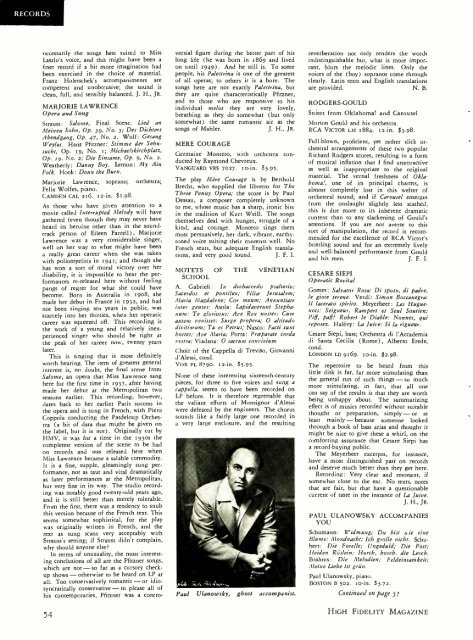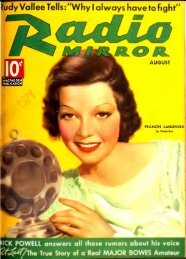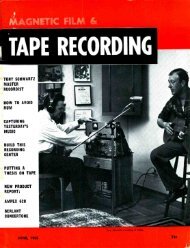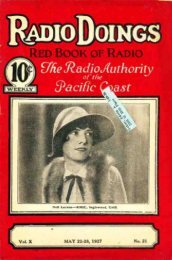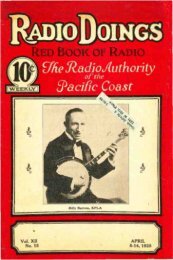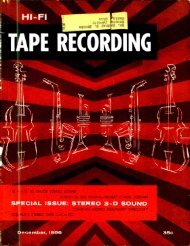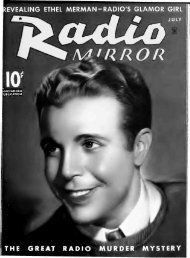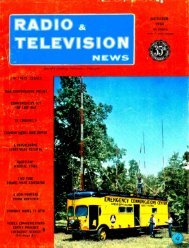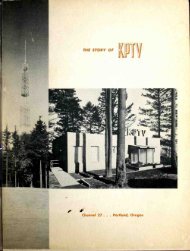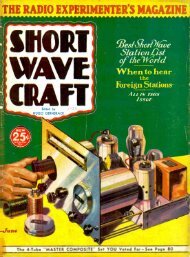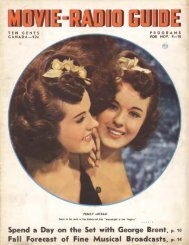Aug - AmericanRadioHistory.Com
Aug - AmericanRadioHistory.Com
Aug - AmericanRadioHistory.Com
Create successful ePaper yourself
Turn your PDF publications into a flip-book with our unique Google optimized e-Paper software.
RECORDS<br />
necessarily the songs best suited to Miss<br />
Laszlo's voice, and this might have been a<br />
finer record if a bit more imagination had<br />
been exercised in the choice of material.<br />
Franz Holetschek's accompaniments are<br />
competent and unobtrusive; the sound is<br />
clean, full, and sensibly balanced. J. H., JR.<br />
MARJORIE LAWRENCE<br />
Opera and Song<br />
Strauss: Salome, Final Scene. Lied an<br />
Meinen Sohn, Op. 39, No. 5; Des Dichters<br />
Abendgang, Op. 47, No. 2. Wolf: Gesang<br />
Weylas. Hans Pfitzner: Stimme der Sehnsucht,<br />
Op. 19, No. I; Michaelskirchplatz,<br />
Op. 19, No. 2; Die Einsame, Op. 9, No. 2.<br />
Weatherly: Danny Boy. Lemon: My Ain<br />
Folk. Hook: Doun the Burn.<br />
Marjorie Lawrence, soprano; orchestra;<br />
Felix Wolfes, piano.<br />
CAMDEN CAL 216. 12 -in. $1.98.<br />
As those who have given attention to a<br />
movie called Interrupted Melody will have<br />
gathered (even though they may never have<br />
heard its heroine other than in the soundtrack<br />
person of Eileen Farrell), Marjorie<br />
Lawrence was a very considerable singer,<br />
well on her way to what might have been<br />
a really great career when she was taken<br />
with poliomyelitis in 1941; and though she<br />
has won a sort of moral victory over her<br />
disability, it is impossible to hear the performances<br />
re- released here without feeling<br />
pangs of regret for what she could have<br />
become. Born in Australia in 1908, she<br />
made her debut in France in 1932, and had<br />
not been singing ten years in public, was<br />
scarcely into her thirties, when her operatic<br />
career was squeezed off. This recording is<br />
the work of a young and relatively inexperienced<br />
singer who should be right at<br />
the peak of her career now, twenty years<br />
later.<br />
This is singing that is most definitely<br />
worth hearing. The item of greatest general<br />
interest is, no doubt, the final scene from<br />
Salome, an opera that Miss Lawrence sang<br />
here for the first time in 1937, after having<br />
made her debut at the Metropolitan two<br />
seasons earlier.<br />
This recording, however,<br />
dates back to her earlier Paris success in<br />
the opera and is sung in French, with Piero<br />
Coppola conducting the Pasdeloup Orchestra<br />
(a bit of data that might be given on<br />
the label, but it is not). Originally cut by<br />
HMV, it was for a time in the 193os the<br />
completest version of the scene to be had<br />
on records and was released here when<br />
Miss Lawrence became a salable commodity.<br />
It is a fine, supple, gleamingly sung performance,<br />
not as taut and vital dramatically<br />
as later performances at the Metropolitan,<br />
but very fine in its way. The studio recording<br />
was notably good twenty-odd years ago,<br />
and it is still better than merely tolerable.<br />
From the first, there was a tendency to snub<br />
this version because of the French text. This<br />
seems somewhat sophistical, for the play<br />
was originally written in French, and the<br />
text as sung scans very acceptably with<br />
Strauss's setting; if Strauss didn't complain,<br />
why should anyone else?<br />
In terms of unusuality, the most interesting<br />
conclusions of all are the Pfitzner songs,<br />
which are not - so far as a cursory checkup<br />
shows - otherwise to be heard on LP at<br />
all. Too conservatively romantic -or idiosyncratically<br />
conservative - to please all of<br />
his contemporaries, Pfitzner was a contro-<br />
54<br />
versial figure during the better part of his<br />
long life (he was born in 1869 and lived<br />
on until 1949). And he still is. To some<br />
people, his Palestrina is one of the greatest<br />
of all operas; to others it is a bore. The<br />
songs here are not exactly Palestrina, but<br />
they are quite characteristically Pfitzner,<br />
and to those who are responsive to his<br />
individual melos they are very lovely,<br />
breathing as they do somewhat (but only<br />
somewhat) the same romantic air as the<br />
songs of Mahler.<br />
J. H., JR.<br />
MERE COURAGE<br />
Germaine Montero, with orchestra conducted<br />
by Raymond Chevreux.<br />
VANGUARD VRS 7027. ro -in. $3.95.<br />
The play Mère Courage is by Berthold<br />
Brecht, who supplied the libretto for The<br />
Three Penny Opera; the score is by Paul<br />
Dessau, a composer completely unknown<br />
to me, whose music has a sharp, ironic bite<br />
in the tradition of Kurt Weill. The songs<br />
themselves deal with hunger, struggle of a<br />
kind, and courage. Montero sings them<br />
most persuasively, her dark, vibrant, earthy -<br />
toned voice suiting their contents well. No<br />
French texts, but adequate English translations,<br />
and very good sound. J. F. I.<br />
MOTETS OF THE VENETIAN<br />
SCHOOL<br />
A. Gabrieli: In dechacordo psa/terio;<br />
Sacerdos et pontifex; Filix Jerusalem;<br />
Maria Magdalene; Cor meum; Annuntiate<br />
inter gentes: Asola: Lapidaverunt Stephanum:<br />
Te gloriosus; Ave Rex poster; Cum<br />
auteur venisset: Surge propera; O altitudo<br />
divitisrum; Tu es Petras; Nasco: Facti sont<br />
hostes; Ave Maria; Porta: Prwparate corda<br />
rests; Viadana: O sacrum convivium<br />
Choir of the Cappella di Treviso, Giovanni<br />
d'Alessi, cond.<br />
Vox PL 879o. 12 -in. 55.95.<br />
None of these interesting sixteenth -century<br />
pieces, for three to five voices and sung a<br />
cappella, seems to have been recorded on<br />
LP before. It is therefore regrettable that<br />
the valiant efforts of Monsignor d'Alessi<br />
were defeated by the engineers. The chorus<br />
sounds like a fairly large one recorded in<br />
a very large enclosure, and the resulting<br />
Paul Ulanousky, ghost accompanist.<br />
reverberation not only renders the words<br />
indistinguishable but, what is more important,<br />
blurs the melodic lines. Only the<br />
voices of the (boy) sopranos come through<br />
clearly. Latin texts and English translations<br />
are provided. N. B.<br />
RODGERS -GOULD<br />
Suites from Oklahoma! and Carousel<br />
Morton Gould and his orchestra.<br />
RCA VICTOR LM 1884. 12 -in. $3.98.<br />
Full-blown, proficient, yet rather slick orchestral<br />
arrangements of these two popular<br />
Richard Rodgers scores, resulting in a form<br />
of musical inflation that I find unattractive<br />
as well as inappropriate to the original<br />
material. The vernal freshness of Oklahoma!,<br />
one of its principal charms, is<br />
almost completely lost in this welter of<br />
orchestral sound; and if Carousel emerges<br />
from the onslaught slightly less scathed,<br />
this is due more to its inherent dramatic<br />
content than to any slackening of Gould's<br />
attentions. If you are not averse to this<br />
sort of manipulation, the record is recommended<br />
for the excellence of RCA Victor's<br />
bristling sound and for an extremely lively<br />
and well -balanced performance from Gould<br />
and his men. J. F. I.<br />
CESARE SIEPI<br />
Operatic Recital<br />
Gomes: Salvator Rosa: Di sposo, di padre,<br />
le gioie serene. Verdi: Simon Boccanegra:<br />
Il lacerato spirito. Meyerbeer: Les Huguenots.<br />
Seigneur, Rampert et Seul Soutien;<br />
Pill, pail! Robert le Diable: Nonnes, qui<br />
reposez. Halévy: La Juive: Si la rigueur.<br />
Cesare Siepi, bass; Orchestra di l'Accademia<br />
di Santa Cecilia (Rome), Alberto Erede,<br />
cond.<br />
LONDON LD 9169. Io -in. $2.98.<br />
The repertoire to be heard from this<br />
little disk is far, far more stimulating than<br />
the general run of such things -so much<br />
more stimulating, in fact, that all one<br />
can say of the results is that they are worth<br />
being unhappy about. The summarizing<br />
effect is of musics recorded without suitable<br />
thought or preparation, simply-or at<br />
least mainly - because someone looked<br />
through a book of bass arias and thought it<br />
might be nice to give these a whirl, on the<br />
comforting assurance that Cesare Siepi has<br />
a record -buying public.<br />
The Meyerbeer excerpts, for instance,<br />
have a most distinguished past on records<br />
and deserve much better than they get here.<br />
Recording: Very clear and resonant, if<br />
somewhat close to the ear. No texts, notes<br />
that are fair, but that have a questionable<br />
current of taste in the instance of La Juive.<br />
J. H., JR.<br />
PAUL ULANOWSKY ACCOMPANIES<br />
YOU<br />
Schumann: Widmung; Du bist nie eine<br />
Blume: Mondnacht; Ich grolle nicht. Schubert:<br />
Die Forelle; Ungeduld; Die Post;<br />
Heiden Röslein; Horch, horch, die Lerch.<br />
Brahms: Die Melodien; Feldeinsamkeit;<br />
Meine Liebe ist grün.<br />
Paul Ulanowsky, piano.<br />
BOSTON B 502. 10 -in. $3.72.<br />
Continued on page 57<br />
HIGH FIDELITY MAGAZINE


